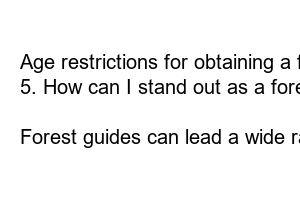숲해설가 자격증 따는 법
Are you passionate about nature and the great outdoors? Do you enjoy spending time in the forest, exploring its hidden wonders and sharing your knowledge with others? If so, becoming a forest guide may be the perfect career path for you. In this blog post, we will guide you through the process of obtaining a forest guide license, so you can turn your love for nature into a rewarding profession.
1. **Research the Requirements**
Before you can become a forest guide, you need to meet certain requirements set by the relevant authorities. These requirements may vary depending on your location, so it’s important to do thorough research to ensure you are on the right track.
To obtain a forest guide license, you will typically need to complete a training program, pass an exam, and meet any other specific requirements set by the governing body in your area.
2. **Enroll in a Training Program**
Once you have a clear understanding of the requirements, the next step is to enroll in a forest guide training program. These programs are designed to provide you with the knowledge and skills you need to lead groups of people through the forest safely and responsibly.
During the training program, you will learn about the local flora and fauna, environmental conservation, first aid, and effective communication with visitors.
3. **Pass the Exam**
After completing the training program, you will need to pass an exam to demonstrate your knowledge and skills as a forest guide. The exam will typically test your understanding of the local ecosystem, hiking safety, and other relevant topics.
Studying diligently and practicing your skills will increase your chances of passing the exam on your first attempt.
4. **Obtain Your License**
Once you have successfully passed the exam, you can apply for your forest guide license. This license will allow you to officially work as a forest guide and lead groups of visitors through the forest.
Be sure to follow the application process carefully and provide any necessary documentation to ensure a smooth and efficient licensing process.
5. **Join a Professional Association**
To further enhance your career as a forest guide, consider joining a professional association for guides in your area. These associations provide networking opportunities, continuing education, and other valuable resources to help you succeed in your role.
6. **Start Guiding Tours**
With your forest guide license in hand, it’s time to start leading tours and sharing your passion for nature with others. Whether you work for a tour company or operate independently, remember to always prioritize the safety and enjoyment of your guests.
In summary, becoming a forest guide involves researching the requirements, enrolling in a training program, passing an exam, obtaining your license, joining a professional association, and starting to guide tours. By following these steps, you can embark on a rewarding career as a forest guide and inspire others to connect with nature.
**FAQs**
1. What are the benefits of becoming a forest guide?
Becoming a forest guide allows you to share your love for nature with others, explore the great outdoors, and potentially earn a living doing what you enjoy.
2. How long does it take to get a forest guide license?
The time it takes to obtain a forest guide license varies depending on the training program and exam schedule in your area.
3. Can I become a forest guide with no prior experience?
While prior experience in guiding or outdoor education can be helpful, it is not always required to become a forest guide.
4. Are there age restrictions for obtaining a forest guide license?
Age restrictions for obtaining a forest guide license may vary by location, so be sure to check with the governing body in your area.
5. How can I stand out as a forest guide?
To stand out as a forest guide, focus on providing excellent customer service, sharing your knowledge enthusiastically, and continuously building your skills and expertise.
6. What types of tours can a forest guide lead?
Forest guides can lead a wide range of tours, including nature walks, birdwatching expeditions, educational programs, and more, depending on their interests and expertise.

